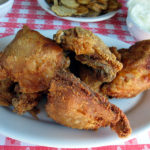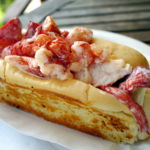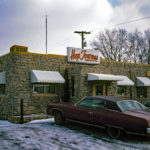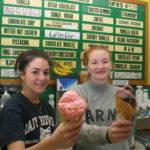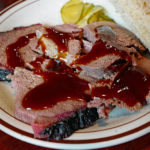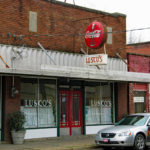From Steak To nuts
EARLY IN THE MORNING, the corner of Main Street and Railroad Avenue in Winters, California, is crowded with bikes—Schwinns and Cannondales, not Harleys and BMWs—pedaled into this quiet hamlet from nearby Davis, a university town 15 miles from Sacramento that is as friendly to spandex as Seattle is to flannel. Cyclists congregate at the Putah Creek Café, where they dig into breakfasts of biscuits and gravy, hot bread pudding with espresso sauce, or coarse-cut oatmeal veined with brown sugar.
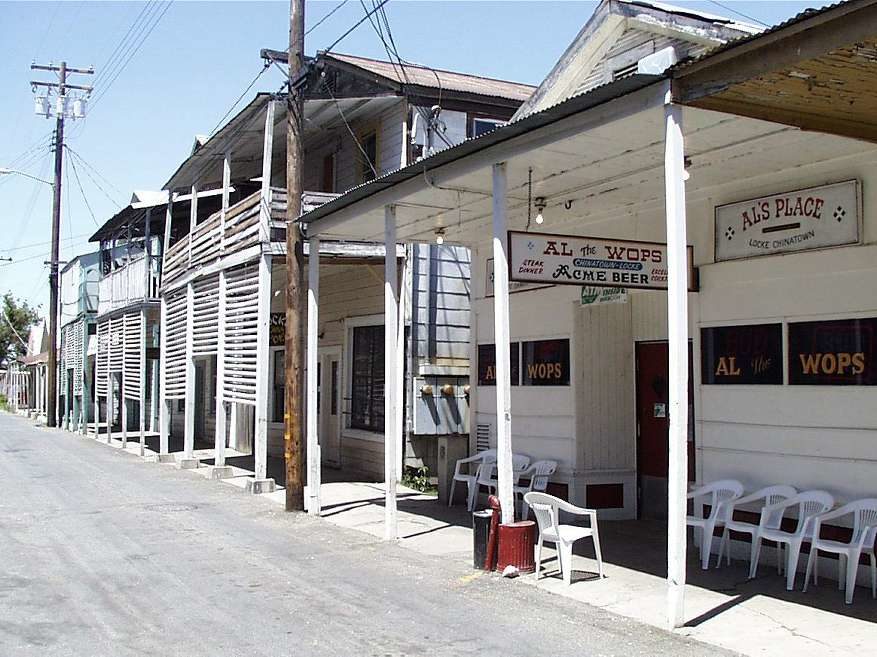
By Jane and Michael Stern
Originally Published 2000 Gourmet Magazine
EARLY IN THE MORNING, the corner of Main Street and Railroad Avenue in Winters, California, is crowded with bikes—Schwinns and Cannondales, not Harleys and BMWs—pedaled into this quiet hamlet from nearby Davis, a university town 15 miles from Sacramento that is as friendly to spandex as Seattle is to flannel. Cyclists congregate at the Putah Creek Café, where they dig into breakfasts of biscuits and gravy, hot bread pudding with espresso sauce, or coarse-cut oatmeal veined with brown sugar.
Local farmers and Main Street business folk, as well as crews of packers from the Mariani Nut Company across Railroad Avenue, sit alongside the bike riders, while Janet Valadez, Putah-Creek’s manager, spends most of her morning greeting everyone who enters, nearly all by name.
Valadez gestures toward a large round table in the back room that is occupied all morning by a constantly changing population of six to eight men. “Those are our farmers,” she tells us. “We get three shifts of them every morning. At six it’s mostly walnut and grape growers. By nine it’s a prune table, and after them come more nuts.” She points out that this table is topped with bare wood, unlike the booth tables, which are covered with leatherette cloths. “They flip coins to decide who pays for coffee. They told me a cloth would muffle the sound and ruin the flip.”
Many things these farmers grow are served at the Putah Creek Café, although it is a source of frustration to the prune men that Valadez has never had success with prune dishes on the menu. Walnuts, on the other hand, are a kitchen staple. They are used in the carrot cake, in brownies, in oatmeal-apricot-raisin-walnut cookies, and they are also mixed into oatmeal and fruit salad. When the café is open for supper—Thursdays through Saturdays—walnuts are also the crowning touch on penne with sundried tomatoes and artichokes. In another context, such a pasta dish might seem precious; here it is simply a local expression of what is grown nearby.
Putah Creek does not make a fetish of serving “California cuisine.” Indeed, some of the best things to eat are the sort of regional fare you’d hope to find in any good ranchland café west of the Mississippi. The chicken-fried steak is a beauty, elegant and virtually greaseless, with a thin golden crust, accompanied by a mountainous biscuit and spread with cream gravy. Home-fried potatoes that accompany eggs are extraordinarily tasty: chunky spud rectangles with a vividly seasoned crust and soft insides. The Putah Creek scramble is a version of what Tex-Mex cooks know as migas—eggs scrambled with a corn tortilla, cheese, chiles, and crumbled chorizo. The shreds of tortilla are mostly softened as they cook and become pliable cushions for the chiles and chorizo, and the pieces of tortilla that get sizzled crisp on the griddle create a wicked corn crunch among the creamy eggs. This colorful concoction comes with a generous pile of home fries and a plate of soft flour tortillas, but our waitress says that her favorite way of eating scramble is with corn, not flour, tortillas on the side, along with a dish of sour cream. “I pile some of everything into a corn tortilla—the eggs, potatoes, and sour cream—and wrap it all up to make one huge morning taco!”
The kitchen’s prowess with Mexican food is evident at lunch in a “Santa Fe corn pie,” which is a baked pudding of eggs, cheese, and cornmeal spiced with roasted green chiles and served with salsa fresca, sour cream, and multicolored corn chips. Putah Creek’s “bowl of red” is a moderately spiced chili made with ground beef and a few beans, served with a pair of hot buttermilk biscuits that are useful for dipping and mopping.
The best dish at lunch is the char-roasted sirloin sandwich. As is de rigueur in the Santa Maria–style barbecue of cattle country farther south, the cut of beef used is the tri-tip, a dense, well-marbled roast that wants to soak up the taste of fire as it is slow-cooked. Putah Creek tri-tips are marinated, then dry-rubbed, charred over an open flame, and finally baked in an applewood smoke oven so that their keen beefiness is laced with the punch of the spice rub and smoke from the wood fire. Tender enough to bite easily, but with tooth resistance that yields a surge of flavor, the slices are piled inside a puffy bun with a layer of sweet grilled onions. We always make a point of eating beef sandwiches wherever they are a matter of pride, and these are some of the nation’s best.
Putah Creek is clean and cozy, with a kitchenette collection from the 1950s that includes a shelf lined with aluminum pastel tumblers, Fiestaware, and vintage toasters and bread baskets. To regulars, it is home away from home. “You mean you don’t have a place like this where you live?” asks an apricot grower when we chat about his favorite meal (the char-roasted sirloin sandwich). “Too bad,” he says with a note of pity in his voice.
IF YOU ARE TRAVELING the Central Valley in search of tasty meals served with heaps of personality, find Locke, a ghostly little town in the Sacramento delta. Still home to some of its original Chungshan Chinese, the old levee community was once notorious for its gambling halls, brothels, and, last—maybe least—of its pleasures, Cantonese food. Locke is forlorn today, with few residents left, but its weathered main street of wood-plank alleys and shuttered emporiums with swaybacked second-story balconies remains a magical sight. In the middle of town is Al’s Place, which has been thriving since 1934, when Al Adami, a convicted bootlegger fresh out of prison, opened up the only non-Chinese restaurant in town. Al had no menu. He simply asked you how you liked your steak, which was the only thing to eat amid the slot machines and card tables in the dining room behind the front-room bar. Legend has it that a hungry crop duster came in one day with jars of peanut butter and marmalade and asked Al for some toast to spread them on. Al liked the idea and started putting peanut butter and marmalade on every table, a strange tradition that endures.
Now run by brothers Stephen and Lorenzo Giannetti, Al’s Place still feels illicit. You enter through a dimly lit bar hung with dusty game trophies and memorabilia, passing the beer-and-shooter crowd on the way. After emerging into a bright back dining room, you spot worn laminate tables with shared benches instead of chairs that seat anywhere from two to eight friends or strangers, depending on how crowded it is. The old wood floor creaks as Stephen Giannetti carries steaks to the tables, and, in lieu of music, the room is serenaded with a constant sizzle of meat from the adjoining kitchen.
The menu remains simple but now includes hamburgers, cheeseburgers, and steak sandwiches in addition to just steak. The burgers are juicy; they’re served between thick slices of grilled-crisp French bread with lettuce, tomato, onion, pickle, and olives on the side. The steak sandwich is, in fact, not a sandwich but a sandwich-size steak on a platter accompanied by a second plate of toasted pieces of the sturdy bread. Horseradish and minced garlic are available for spreading on the meat. “Most people put the peanut butter or jelly on their toast,” Stephen remarks, “but I’ve seen some people spread peanut butter right across their steaks.”
When we ask him if he hears any complaints about the name by which regular customers know the restaurant, and which is emblazoned above its front door—Al the Wops—he answers flatly, “No,” as if only some sort of dimwit pedant would worry about such a nonissue. He then continues: “I am Italian, and I don’t mind. It’s all in how it’s said, anyway. Wop simply means ‘without papers.’ What’s wrong with that?”
On the way out, through the barroom in front, we happen to notice that the high ceiling, far out of reach for even the tallest person, is crowded with dollar bills affixed with thumbtacks. Mickey, the bartender, tells us that the money on the ceiling is a tradition that goes back to Al’s era, but it will cost us a dollar to find out how it gets there. So we give him a bill, which he somehow curls around a thumbtack and a heavy silver dollar. In the blink of an eye, he flips this package upward. All that comes down is his silver dollar. Our dollar is now tacked to Al’s ceiling.
“What happens when the ceiling is full of money?” we ask.
“It is harvested in the winter,” Mickey answers. “It goes toward the big February liver feed. We cook liver and onions for the whole town—free.”
Much as we enjoy a good plate of liver and onions, odds are against our getting back to Locke for the feast, but this information, we figure, is well worth the dollar we spent to get it.
Discuss
What do you think of From Steak To nuts?
Related Articles
Stroud’s
By Jane and Michael Stern Originally Published 1995 Gourmet Magazine Chicken...
The Lobster Roll Honor Roll
Maine is the only state in America that features a picture of cooked food on its license...
Meat-And-Three
A few years back, country singer Ray Stevens invited a New York friend to join him at one of...
Top 12 favorite Ice Cream Scoops
WITH THE EXCEPTION of the hot dog bun, there has never been an edible invention as...
Top 5 BBQ Restaurants | Western Kentucky
Get yourself to Western Kentucky for great BBQ I see the food shows on TV where...
Best restaurants in Greenwood, MS | Hot Licks Delta Style
Ever since we first ate margarine-sauced pompano at Lusco’s, in Greenwood,...

